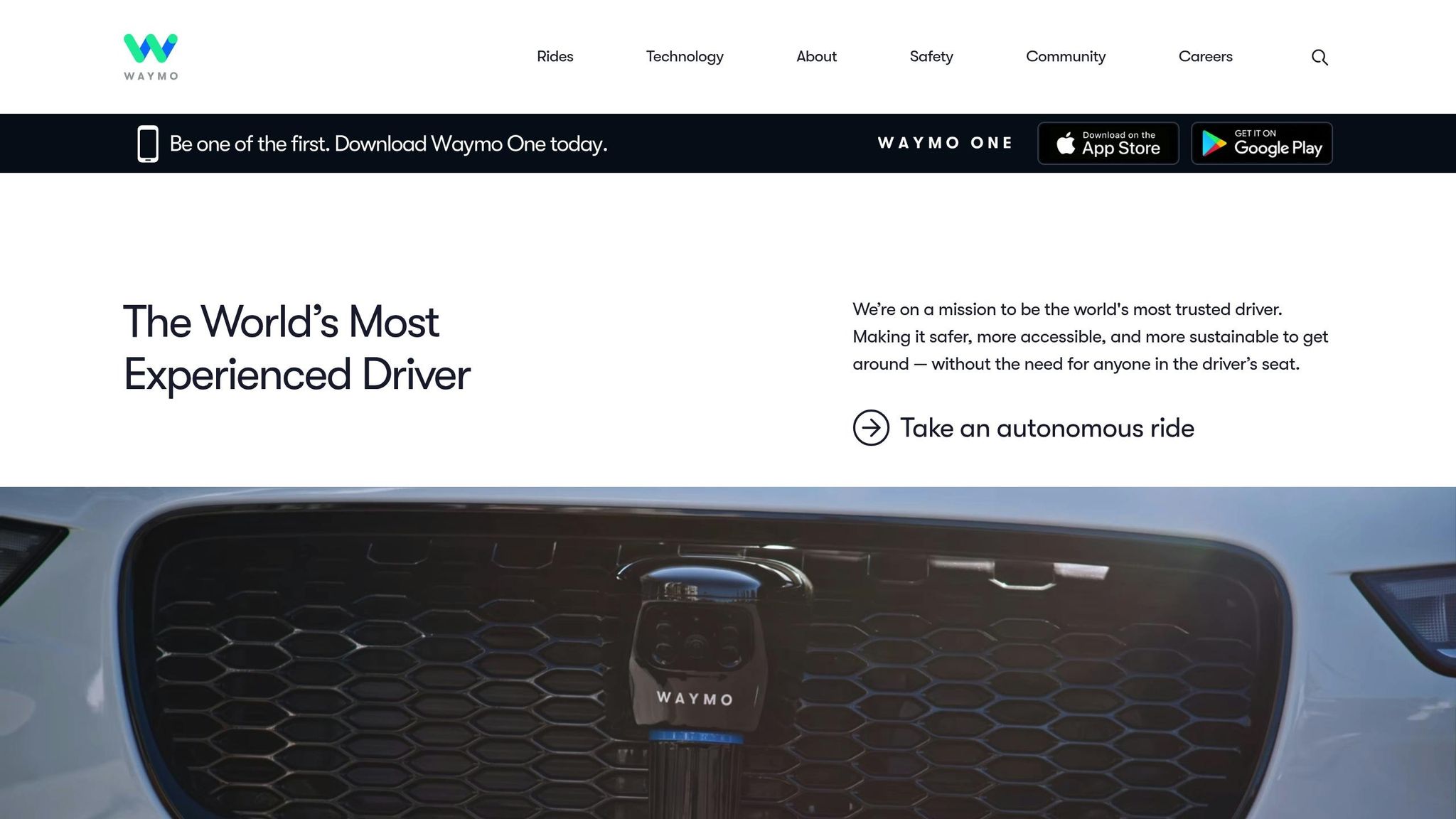Investment Opportunities in Self-Driving Startups

The self-driving industry is growing fast, with U.S. market projections jumping from $22.6 billion in 2024 to $222.8 billion by 2033 - a growth rate of 28.92% annually. Companies like Waymo (Alphabet) and Cruise (GM) are leading the charge, while advisory firms like Phoenix Strategy Group (PSG) are helping startups navigate financial hurdles. Here's a quick breakdown:
- Waymo: Market leader with over 250,000 weekly rides and a valuation of $45 billion. Strong safety record but faces challenges with high costs and profitability.
- Cruise: Shifted focus from robotaxis to integrating autonomy into GM vehicles. Despite raising $16 billion, it faces setbacks from regulatory issues and operational losses.
- PSG-backed Startups: Offer high-risk, high-reward potential, supported by expert financial guidance to tackle development costs and scale effectively.
For investors, the choice depends on risk tolerance. Established players like Waymo offer stability, while PSG-supported startups provide opportunities for higher returns if they achieve key milestones. Diversifying investments across hardware, software, and service providers can help balance risk and reward.
1. Waymo (Alphabet)

Waymo, backed by Alphabet, leads the charge in the autonomous vehicle investment space. In October 2024, the company closed a massive $5.6 billion Series C funding round, spearheaded by Alphabet and joined by other prominent investors. This brought Waymo's valuation to over $45 billion, solidifying its position as one of the most valuable companies in the self-driving sector.
Since its inception in 2009 as a Google project, Waymo has taken a unique path. Spinning off as an Alphabet subsidiary gave it a solid financial base, allowing it to secure a total of $11.1 billion in funding from 2020 to 2024. Operationally, the company is thriving. By April 2025, Waymo was completing over 250,000 paid rides weekly across four U.S. markets, a dramatic jump from the 10,000 weekly rides it reported in May 2023. Its fleet now exceeds 1,500 vehicles, with plans to double that number to 3,500 by 2026, setting the stage for substantial revenue growth.
Revenue projections highlight this momentum. Ride revenue is expected to soar from $125 million in 2024 to over $1.3 billion by 2027, with high-demand areas like San Francisco delivering much stronger returns compared to markets such as Phoenix.
Safety is a cornerstone of Waymo's appeal. Over an impressive 56.7 million miles, Waymo vehicles recorded 85% fewer serious crashes and 96% fewer intersection-related injury incidents compared to human drivers. A Swiss Re study further revealed that Waymo vehicles had 88% fewer property damage claims and 92% fewer injury claims than human-driven vehicles. Waymo's co-CEO, Tekedra Mawakana, emphasized the importance of trust in this emerging industry:
"Trust is hard to build and easy to lose. Not just Tesla, but there have been other companies that have come and gone that have had very, very audacious claims. We've learned the amount of humility needed: Ultimately, it's the riders who are going to decide."
Transparency is another area where Waymo sets itself apart. David Kidd, a senior research scientist at the IIHS, praised the company’s openness:
"What has been refreshing about Waymo is they're open to sharing information and working in an academic way with independent groups. They're at the fore of something that nobody else is doing right now, which is furnishing all of their data. They've provided a model which other companies can follow for increasing transparency."
However, challenges remain. Each Waymo vehicle comes with a hefty price tag - around $175,000 - with the autonomous driving hardware alone adding approximately $100,000. Currently, rides are priced 30–40% higher than comparable trips with Uber or Lyft, meaning profitability hinges on scaling operations further.
Thanks to Alphabet’s financial backing and Waymo’s early start in autonomous vehicle development, the company is well-positioned to maintain its leadership in this rapidly growing market. Next, let’s take a closer look at how Cruise is integrating self-driving technology into personal vehicles.
2. Cruise (GM)
Cruise, founded in 2013, became part of General Motors in March 2016 through an acquisition valued between $500 million and over $1 billion. This acquisition laid the groundwork for the company’s rapid growth and substantial funding rounds.
By March 2025, Cruise had raised a staggering $16.05 billion in total funding, driven by key investments such as $2.25 billion from SoftBank in May 2018, Honda's $750 million investment (along with a $2 billion commitment), a $1.15 billion round in May 2019, and a $2 billion round in January 2021 that included Microsoft and other institutional investors. These efforts brought Cruise’s valuation to an impressive $30 billion.
In a significant shift, GM decided in December 2024 to halt funding for Cruise's robotaxi development, redirecting focus toward incorporating autonomous technology into advanced driver assistance systems. GM CEO Mary Barra explained:
"GM is committed to delivering the best driving experiences to our customers in a disciplined and capital efficient manner."
This strategic pivot has financial implications: Microsoft recorded an $800 million impairment charge in Q2 2025, and GM anticipates reducing its annual spending by over $1 billion once restructuring is completed in the first half of 2025.
Cruise has made remarkable strides in autonomous technology, particularly in navigating complex urban environments. The company has surpassed 10 million driverless miles and achieved Level 4 autonomy. Its fleet of over 300 Chevrolet Bolt EVs is set to grow with the introduction of the custom-built Origin vehicle. However, at about $0.90 per mile, Cruise’s pricing remains higher than competitors like Waymo.
Despite these technical achievements, Cruise faces significant financial and regulatory hurdles. The company has accumulated over $10 billion in operating losses while generating less than $500 million in revenue. A pedestrian collision in October 2023 resulted in the California DMV suspending Cruise’s self-driving permits and a recall of 950 vehicles. On a brighter note, Cruise reported an impressive average disengagement distance of 95,900 miles in 2022.
GM currently holds about 90% ownership of Cruise and aims to increase its stake to more than 97%. Mary Barra emphasized the strategic importance of this move:
"Cruise has been an early innovator in autonomy, and deeper integration with GM's brands, scale, and manufacturing strength will advance our vision for the future of transportation."
For investors, Cruise represents both the promise and the challenges of autonomous vehicle technology - balancing groundbreaking advancements and substantial funding with regulatory setbacks, operational losses, and strategic shifts that could reshape its future.
3. Phoenix Strategy Group

While companies like Waymo and Cruise dominate the technology and market landscape of autonomous vehicles (AV), there's another critical piece to the puzzle: the financial strategies that keep these innovations moving forward. That’s where Phoenix Strategy Group steps in. Rather than focusing on tech development, this advisory firm specializes in guiding AV startups through the financial challenges of scaling from concept to market-ready businesses.
Founded by David Metzler, John Zdanowski, and Ethan Lu, Phoenix Strategy Group has made a name for itself by supporting founder-led companies. Their track record speaks volumes: over 240 portfolio companies, more than $200 million raised in just the past year, and 100+ mergers and acquisitions. For AV startups, which face the dual challenge of creating groundbreaking technology while building sustainable business models, this level of expertise can be a game-changer.
The financial hurdles in the AV industry are no small matter. Startups burn through capital at lightning speed during the development phase, need precise financial modeling for fleet operations, and face hefty regulatory compliance costs. Phoenix Strategy Group tackles these challenges with a unified approach to finance and revenue operations, ensuring startups have the tools they need to succeed.
David Darmstandler, Co-CEO of DataPath, praised their efficiency:
"As our fractional CFO, they accomplished more in six months than our last two full-time CFOs combined. If you're looking for unparalleled financial strategy and integration, hiring PSG is one of the best decisions you can make."
For self-driving startups, PSG’s fractional CFO services are particularly valuable during critical funding stages. They craft detailed financial models that incorporate operational metrics like sensor costs, vehicle maintenance, insurance, and compliance expenses. This holistic approach helps startups manage their resources effectively while preparing for the next phase of growth.
But it’s not just about the numbers. PSG’s expertise in data engineering is a perfect match for the data-heavy world of autonomous vehicles. Self-driving technology generates massive amounts of sensor data, and PSG turns this data into actionable financial insights, helping startups make informed decisions.
Norman Rodriguez, Founder and CEO of ElevateHire, shared how PSG helped him during a tough time:
"PSG saved my dream. They helped us get our financials in order and renegotiate our lending agreements, pulling us through a tough financial crunch."
Phoenix Strategy Group also excels in investment banking, having supported numerous successful exits, including over five IPOs. From initial valuations and due diligence to deal structuring and negotiations, they ensure that AV startups are well-positioned for smooth exits in a rapidly consolidating industry.
Their "Monday Morning Metrics" system is another standout feature. This weekly financial reporting tool provides real-time insights into burn rates, milestone progress, and operational efficiency, which can be critical for maintaining investor trust during long development cycles. It’s a system designed to keep startups on track and investors confident.
Patrick Wallain, Founder and CEO of ABLEMKR, summed it up perfectly:
"If you want to sleep better at night, hire Phoenix Strategy Group."
For autonomous vehicle startups navigating the complex world of technical innovation and financial management, Phoenix Strategy Group offers a lifeline. Their proven ability to help companies secure funding, manage growth, and achieve successful exits makes them an indispensable partner for those ready to scale beyond the prototype stage. In the race to revolutionize transportation, having a solid financial strategy is just as important as cutting-edge technology. Phoenix Strategy Group ensures that startups have both.
sbb-itb-e766981
Advantages and Disadvantages
When looking at investment opportunities in the self-driving industry, each company brings its own set of strengths and challenges. Understanding these trade-offs is key to making smart investment choices. The table below breaks down these factors for a side-by-side comparison.
Waymo has solidified its position as a market leader, backed by a strong financial foundation. The company has raised $11.15 billion in funding and boasts a valuation exceeding $45 billion. Operationally, Waymo shines with over 250,000 weekly rides across major markets. Its safety record is a standout feature - according to its Safety Impact report, Waymo vehicles have driven 71 million autonomous miles, resulting in 88% fewer crashes causing serious injuries and 78% fewer injury-related accidents compared to human drivers.
However, Waymo isn’t without its challenges. Its ride fares are about 30–40% higher than traditional ride-hailing services, making it harder to achieve widespread market adoption. Despite its impressive growth, Waymo still represents only a small portion of the overall ride-hailing market. Additionally, the company faces the complex task of scaling profitably across multiple cities.
Cruise, on the other hand, presents a more complicated scenario. In December 2024, GM decided to shut down Cruise's standalone robotaxi program, significantly altering its trajectory. Previously, Cruise had secured over $15 billion in funding, backed by GM. However, regulatory issues and a pedestrian accident led to the grounding of its fleet, highlighting how quickly safety and regulatory setbacks can disrupt operations.
GM CEO Mary Barra captured the challenge:
"Cruise was well on its way to a robotaxi business, but when you look at the fact you're deploying a fleet, there's a whole operations piece of doing that."
Following its merger into GM, Cruise saw a 50% staff reduction, effectively ending its independent robotaxi ambitions. While its technology now contributes to GM's Super Cruise system, the standalone investment potential in Cruise as a robotaxi service has been eliminated. This shift has broader financial implications for the autonomous vehicle sector.
Startups Supported by Phoenix Strategy Group offer a different kind of opportunity, balancing risk and reward. These early-stage companies benefit from targeted financial and strategic support, helping them tackle the complex challenges of self-driving technology development. Unlike giants like Waymo, these startups don’t have access to massive funding or manufacturing partnerships. However, their ability to stay agile and focus on tailored strategies can help them achieve critical milestones. Still, as with most startups in a capital-heavy industry, their success hinges on hitting technological goals and forming key partnerships before running out of resources.
| Investment Factor | Waymo | Cruise | PSG-Supported Startups |
|---|---|---|---|
| Funding Status | Raised $11.15 B; Valuation > $45 B | Over $15 B invested (now part of GM) | Variable, supported by financial advisory |
| Market Position | Established leader with 250,000+ weekly rides | Operations shifted; now part of GM's ecosystem | Early-stage with high potential |
| Growth Potential | Expanding into new cities and global markets | Focused on GM integration | Dependent on execution and partnerships |
| Primary Risks | High costs, profitability challenges | Regulatory setbacks, operational issues | Capital limitations, competitive pressures |
| Key Advantages | Strong safety record and operational scale | GM's manufacturing expertise | Agile strategies and financial guidance |
The investment landscape showcases a clear range of risks and rewards. Waymo represents a stable, established option with strong market traction, though it faces hurdles like pricing and profitability. Cruise’s independent ambitions have ended, with its technology now supporting GM’s larger ecosystem. Meanwhile, startups backed by Phoenix Strategy Group offer a high-risk, high-reward scenario. Their innovative edge, combined with focused financial and strategic backing, could deliver substantial returns - if they can navigate the competitive and capital-intensive self-driving industry.
Investors need to carefully assess their appetite for risk and their long-term goals. The choice lies between the steady growth of established players like Waymo and the potential for explosive success with PSG-supported startups.
Final Assessment
The self-driving startup investment scene offers unique opportunities tailored to different types of investors, each with its own appetite for risk and expected returns. Our analysis suggests the sector is bouncing back, reaffirming its potential for commercial growth.
For institutional investors and venture capital firms, the current climate is promising. KPMG reports that 41% of global venture capital in Q1 was directed toward AI startups. Meanwhile, the autonomous vehicle market is forecasted to hit $214.3 billion by 2030, growing at an annual rate of 21.9%. This makes it a prime target for large-scale investments. These investors should prioritize companies with strong research and development capabilities and clear technological goals. As Chase Coleman, Founder of Tiger Global, observed:
"Customers love Waymo. The company has built the safest product in the autonomous vehicle ecosystem as well as the best."
Individual investors, however, face a tougher decision. While UBS predicts that by 2035, 80% of people will use robotaxis, the risks remain steep. For those willing to invest, the focus should be on long-term strategic gains rather than expecting quick returns.
For those seeking a middle ground, Phoenix Strategy Group-backed startups offer a balanced option. These startups, while not as heavily funded as giants like Waymo or Cruise, benefit from targeted financial guidance and nimble strategies that can drive technological breakthroughs. This agility, paired with focused advisory support, helps them navigate the capital-heavy challenges of the autonomous vehicle space.
Investment success in this sector often boils down to risk tolerance, timing, and diversification. Conservative investors might lean toward established players like Waymo, which currently provides one million rides per month and operates over 700 autonomous vehicles. On the other hand, more adventurous investors might explore early-stage startups, particularly in adjacent areas like defense, where interest in autonomous technology is on the rise.
Diversification remains key. Instead of betting on a single company, spreading investments across hardware makers, software developers, and service providers can mitigate risks. For instance, the Boston Consulting Group and Kodiak Robotics have pointed out that autonomous driving technologies could "reduce the total cost of ownership of long-haul trucking by more than 30% through labor savings and driving efficiency gains."
Regulatory challenges are another critical factor to monitor. Recent setbacks faced by Cruise, including operational issues and permit suspensions, highlight how quickly regulatory decisions can impact valuations. Staying informed about evolving rules and safety standards is crucial, as these can significantly influence investment outcomes.
Ultimately, the success of investments in self-driving startups hinges on timing and execution. With 90% of road accidents caused by human error, the societal need for autonomous vehicles is undeniable. As Xiaopeng He, Chairman & CEO of XPENG Motors, remarked:
"I believe 2025 will be a pivotal 'ChatGPT moment' for the fully autonomous driving era, revolutionizing how we interact with technology and fundamentally transforming the way we travel."
Investors must weigh the potential for groundbreaking innovation against the inherent risks.
The most successful strategies will likely combine investments in established leaders with bets on agile, advisory-supported startups. This approach not only spreads risk but also positions investors to benefit from the broader transformation toward AI-driven mobility services, which could redefine industries in the coming decade.
FAQs
What should investors consider when choosing between established players like Waymo and newer startups in the self-driving industry?
When choosing between established players like Waymo and newer startups, investors need to consider several factors. Established companies often bring reliable technology, consistent revenue, and a proven history of regulatory compliance, which can lower the level of risk involved. Startups, on the other hand, might introduce game-changing innovations and promise faster growth, but they also come with challenges like unproven technology and uncertain market acceptance.
Important aspects to evaluate include the company's innovation capabilities, valuation, funding trends, and market opportunities. While established firms usually excel in scaling operations and managing regulatory hurdles, startups can offer the potential for significant returns in untapped markets. Striking the right balance between these factors allows investors to align their choices with their risk appetite and long-term objectives.
How do regulations affect the growth and operations of autonomous vehicle companies like Cruise?
Regulations are a key factor in shaping how autonomous vehicle companies operate and grow. They lay out the safety requirements, liability rules, and operational protocols that directly influence the pace at which these companies can scale and deploy their technologies.
In the U.S., some recent regulatory changes have relaxed certain safety and deployment restrictions, potentially opening the door for quicker adoption of autonomous vehicles. But it's not all smooth sailing. Ongoing debates around safety concerns, liability issues, and cybersecurity risks create a challenging environment. These unresolved issues can slow down widespread deployment and complicate efforts for companies trying to expand across state lines.
Still, this evolving regulatory landscape isn’t just about challenges - it’s also about possibilities. Companies like Cruise have the chance to adapt, innovate, and find ways to comply with these rules while continuing to grow in this fast-moving industry.
How does financial advisory support from Phoenix Strategy Group contribute to the growth of self-driving startups?
Financial advisory services, such as those provided by Phoenix Strategy Group, play a key role in helping self-driving startups grow and thrive. These services assist companies in securing funding, refining financial plans, and preparing for successful exits, all while maintaining a focus on long-term stability and growth potential.
Using cutting-edge technology and data-driven strategies, Phoenix Strategy Group helps startups tackle the challenges of complex financial environments. They guide businesses in optimizing resource allocation and carving out a strong position in the rapidly changing autonomous vehicle industry.



